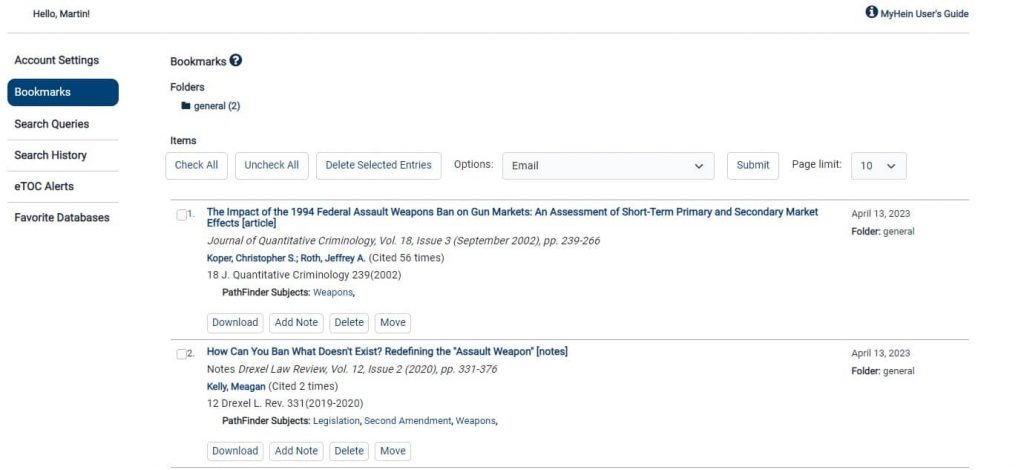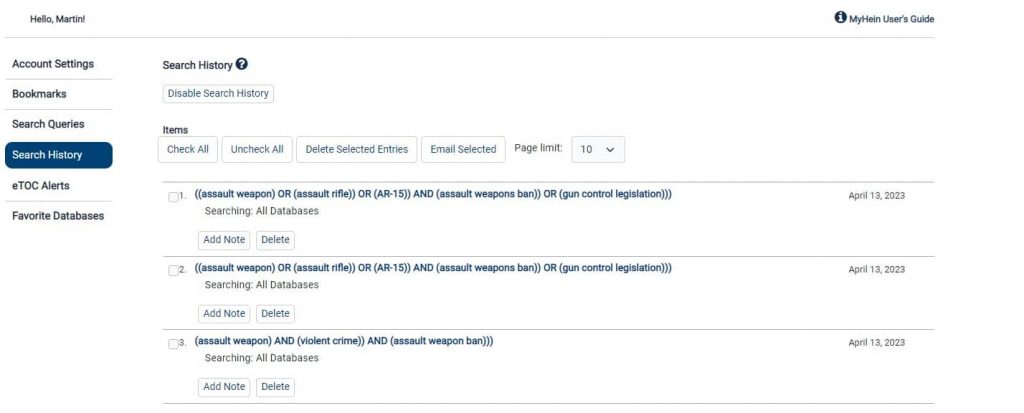Spring Break has passed, and chances are you’re entering the home stretch of the semester. Final papers are on their way, but summer is not far behind. This is a perfect time for another installment of HeinOnline in the Classroom! Keep reading for an in-class activity to help your students construct effective searches on HeinOnline databases, some advice on using our MyHein feature in your classroom, and some general tips and tricks.
In-Class Activity: Building Searches
This in-class activity builds upon another in-class activity from our September HeinOnline in the Classroom post. As part of September’s activity, students developed guiding questions to help them get started with the early stages of an academic research project. This activity takes things a step further, and gives students some practice turning their questions into well-crafted searches using HeinOnline.
This activity specifically pertains to full-text searches—searches based on key words or concepts—which are the kind of searches our students are most likely to undertake in the early and more exploratory stages of the research process. As your students get further along in their research process, they will likely find it useful to use other types of searches as well, such as search by author and title. But for now, let’s start with full-text search.
Instructions:
- Break students up into small groups. Three per group is a good number, but you can adjust to match your class size and needs.
- Have your students identify one research question to focus on.
- Instruct students to identify key concepts in their research question. These should be simple nouns and short phrases. They may need some guidance in the form of an example or two here!
- Have your students make a list of similar terms that may be related to, or synonymous with the key concepts contained in the research question.
- Next, have your students begin putting together searches using different combinations of key concepts and related terms. Encourage them to experiment with different combinations of terms. (This might be a good time to review the use of Boolean operators in searches with your students, if you have not done so already).
- Use the template below to help your students organize their search terms.
- Have your students begin testing out their search terms in groups. I would recommend using the Advanced Search function in the Law Journal Library to start.
Template: Worksheet for Organizing Searches
Research Question:
| Key concept 1 | OR | Synonym of key concept 1 | OR | Synonym of key concept 1 |
| AND | ||||
| Key concept 2 | OR | Synonym of key concept 2 | OR | Synonym of key concept 2 |
| AND | ||||
| Key concept 3 | OR | Synonym of key concept 3 | OR | Synonym of key concept 3 |
| AND | ||||
| Key concept 4 | OR | Synonym of key concept 4 | OR | Synonym of key concept 4 |
Using MyHein in the Classroom
Before beginning this activity, have your students set up MyHein accounts to help manage their research. If you haven’t checked out this incredibly useful feature of HeinOnline yourself, I highly recommend doing so. MyHein allows students to visualize, organize, and share their research progress with each other. It is an especially valuable tool for group projects. Working together as a group, students can pool their research together and see what articles their peers have found and bookmarked for their shared project. Your students can even organize their bookmarked articles into folders, according to their needs.

Another great feature of MyHein for student researchers is that it saves a history of all searches performed while a user is logged on to the account.

This allows a student to keep track of which combinations of search terms were effective (and which were not). In a group setting, it also provides a way for individual members to see what their peers have been searching for, and to divide up research tasks accordingly.
Further Resources
If you or your students need a refresher on using some of HeinOnline’s many search functions, I would recommend checking out the Searching 101 LibGuide.
Classroom Tip of the Month
As you’re thinking about next school year, and making adjustments to your syllabuses, I recommend including a policy on email and other electronic communication. One of our most important jobs as college-level educators is teaching students how to communicate professionally, both inside and outside of the classroom. Part of doing this is modeling healthy behavior and boundaries when it comes to professional communication. Much like we set up regular office hours for our students, I recommend establishing regular “open hours” for communication early on in the semester. At the start of each semester, I inform my students that I will read any email sent to me on a weekday between 8am and 4pm, and I will respond to it within that same business day. I also inform my students that, although I check my email after hours and on the weekends, I do not typically reply outside of regular hours (with the exception of emergencies).
Most importantly—make it clear to your students that this policy goes both ways! Model healthy boundaries and etiquette by refraining from emailing them, or expecting them to otherwise correspond with you, outside of regular hours.



